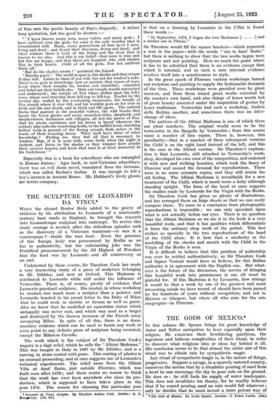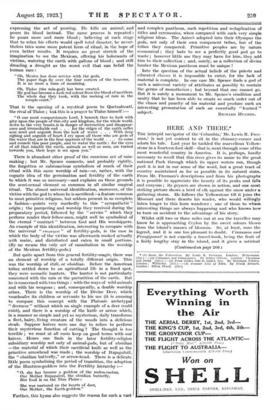THE GODS OF :MEXICO.*
IN this volume Mr. Spence brings his great knowledge of Aztec and Toltec antiquities to bear especially upon their religion. He examales their bewildering pantheon, the ingenious and hideous complexities of their ritual, in order to discover what religious idea or ideas lay behind it all. His conclusion seems to be that almost the entire aim of this ritual was to obtain rain by sympathetic magic.
Any ritual of sympathetic magic is, in the nature of things, progressive. Suppose a savage, in a sparsely watered country, conceives the notion that by a ritualistic pouring of sand from a bowl he can encourage the sky to pour rain on the ground. Ile does so : he still finds his supply of water inadequate. This does not invalidate his theory, for he readily believes that if he ceased pouring sand no rain would fall whatever ; only he decides that he must invent a, more potent way of • The Gods of Mexico. By Ltiii5 Spence. London: T. Fisher Unwla. 1308.1
expressing the act of pouring. He kills an animal, and pours its blood instead. The same process is repeated : he pours more and more blood ; believing at each stage that to relax his efforts would spell total disaster, he never- theless tries some more potent form of ritual, in the hope of even better results. It requires no great stretch of the imagination to see the Mexican, offering his holocausts of victims, watering the earth with gallons of blood ; and still dreading a drought as the worst evil that can befall the human race :
"Oh, Mexico has done service with the gods, The paper flags fly over the four corners of the heavens, It is no more a time of mourning.
Oh, Tlaloe (the rain-god) has been created.
My god has become a dark red colour from the blood of sacrifices. The whole day they took, with the making of rain in the temple-court."
That is the opening of a mystical poem to Quetzalcoatl, the rival of Tlaloc ; but this is a prayer to Tlaloc himself :—
" 0 our most compassionate Lord, I beseech thee to look with pity upon the people of this city and kingdom, for the whole world, down to the very beasts, is in danger of destruction and disappear- ance and irremediable end . . . for the ridges of the earth suffer sore need and anguish from the lack of water . . . With deep sighing and anguish of heart I cry upon all those who are gods of the water that are in the four quarters of the world . . . to come and console this poor people, and to water the earth : for the eyes of all that inhabit the earth, animals as well as men, are turned towards you, their hope is set upon you."
There is abundant other proof of the conscious act of rain- making ; but Mr. Spence connects, and probably rightly, the forgotten or subconscious symbolism of much of their ritual with this same worship of rain—or, rather, with the cognate idea of the germination and fertility of the earth to which it was so necessary—and explains on these grounds the semi-sexual element so common in all similar magical ritual. The almost universal identification, moreover, of the victim with the god to whom he is sacrificed—a feature common to most primitive religions, but seldom present in so complete a fashion—points very markedly to this " sympathetic " origin ; the pampering and worship they received during the preparatory period, followed by the " service " which they perforce render their fellow-men, might well be symbolical of the eternal " contract " between God and His worshippers.
An example of this identification, interesting to compare with the universal " o-raperyaos " of fertility-gods, is the case in which the body of the victim was afterwards cooked actually with maize, and distributed and eaten in small portions.
(By no means the only act of cannibalism in the worship of the Mexican fertility-gods.) But quite apart from this general fertility-magic, there was an element of worship of a totally different origin. This
was the worship of itztff, or obsidian. Before the American tribes settled down to an agricultural life in a fixed spot, they were nomadic hunters. The hunter is not particularly concerned with the rain or the parturition of the earth. But he is concerned with two things : with the ways of wild animals and with his weapons ; and, consequently, a double worship arises. There is the worship of the Divine Deer, which vouchsafes its children or servants to his use (it is amusing to compare this concept with the Platonic archetypal " deerness " without which no single example of a deer could exist), and there is a worship of the knife or arrow which, in a manner so simple and yet so mysterious, daily transforms
a fleet, hairy, living creature of the woods into a delicious steak. Suppose knives were one day to refuse to perform their mysterious function of cutting ? The thought is too terrible ; we must at all costs keep on good terms with our knives. Hence one finds in the later fertility-religion subsidiary worship not only of animal-gods, but of obsidian —the material of which their sacrificial knife as well as the primitive arrowhead was made ; the worship of Itzpapalotl, the "obsidian butterfly," or arrow-head. There is a delicate little poem symbolizing the period of transition, the adoption of the Huntress-goddess into the Fertility hierarchy :—
"0, she has become a goddess of the melon-cactus, Our Mother Itzpapalotl, the obsidian butterfly, Her food is on the Nine Plains :
She was nurtured on the hearts of deer, Our Mother, the Earth-goddess."
Further, this hymn also suggests the reason for such a vast and complex pantheon, such repetition and reduplication of titles and ceremonies, when compared with such very simple religious ideas. The Aztec& adopted into their Olympus the gods, not only of their own component tribes, but of the tribes they conquered. Primitive peoples are by nature economical ; they hate to see a perfectly good god go to waste ; however little use they may have for him, they add him to their collection ; and, surely, as a collection of divine lumber the Mexican pantheon must be unique !
Into the question of the actual beliefs of the priests and educated classes it is impossible to enter, for the lack of material is complete. In one case Mr. Spence finds a god of such a universal variety of attributes as possibly to contain the germs of monotheism ; but beyond that one cannot go. But it is surely a monument to Mr. Spence's erudition and sanity that he has been able to create so much order out of the chaos and paucity of his material and produce such an interesting presentation of such an essentially " learned " subject.
RielIARD HUGHES.



































 Previous page
Previous page